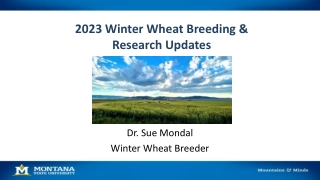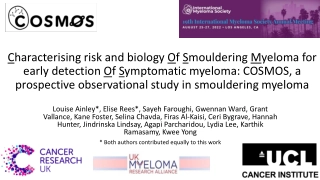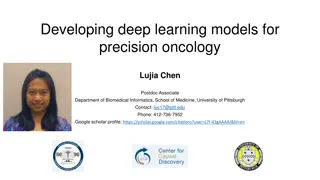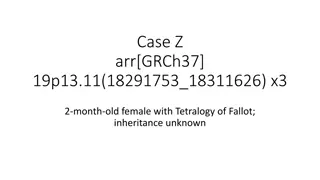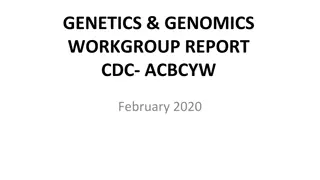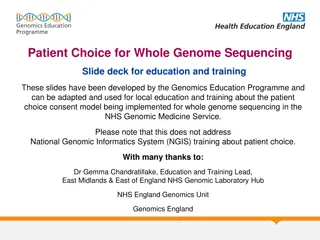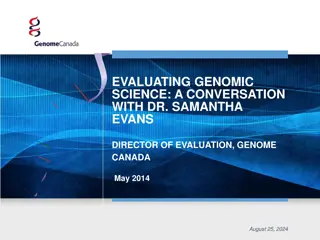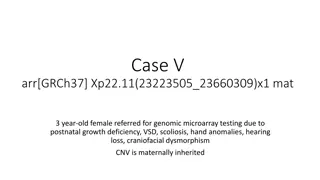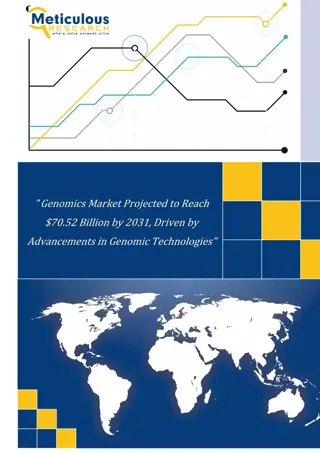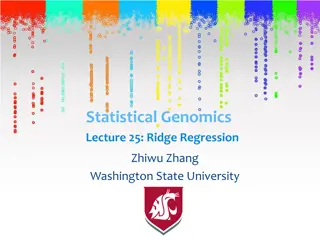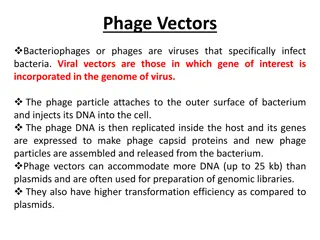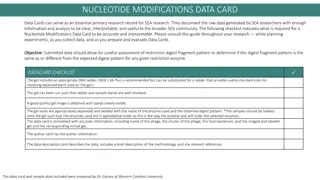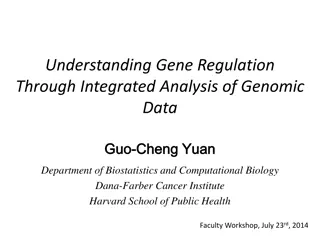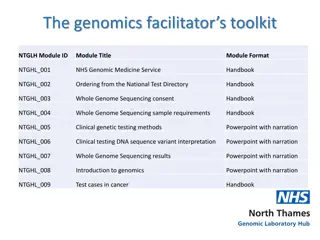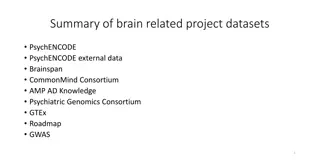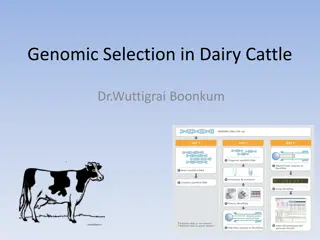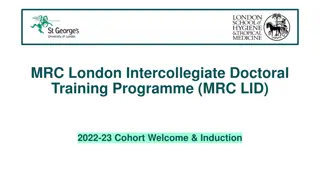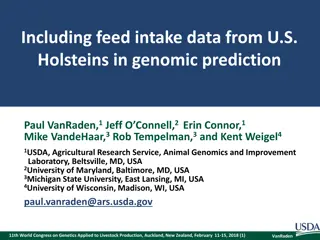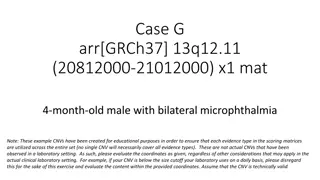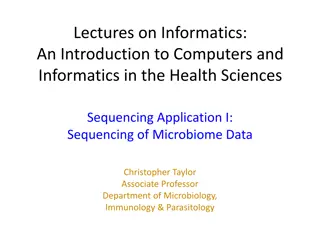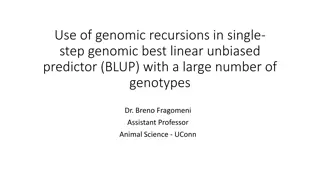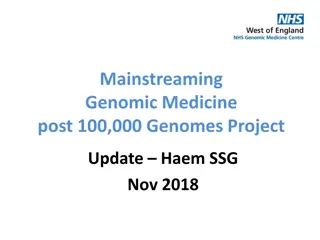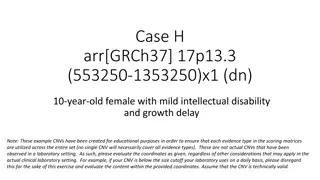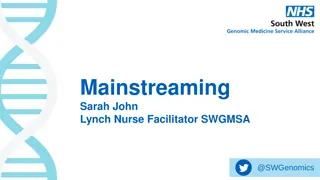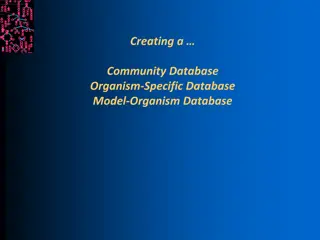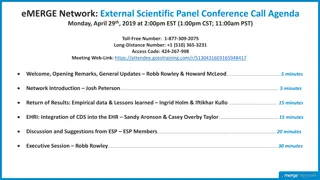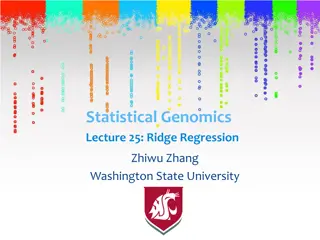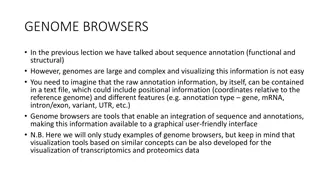2023 Winter Wheat Breeding & Research Updates
Get the latest updates on winter wheat breeding and research from Dr. Sue Mondal, a winter wheat breeder. Explore topics such as abiotic stress tolerance, genomic technologies, rapid cycling, disease resistance, and more.
3 views • 21 slides
Characterising Risk and Biology of Smouldering Myeloma for Early Detection of Symptomatic Myeloma
Understand the risk and biology of smouldering myeloma (SMM) for early detection of symptomatic myeloma. The study will investigate genomic and immune correlates of progression, clonal heterogeneity, and biomarkers using liquid biopsies and T cell phenotype and functionality in SMM.
4 views • 15 slides
Genomic Inference of Human Population Size Changes Over Time
Explore the genomic inference of a severe human bottleneck during the Early to Middle Pleistocene transition, tracing the evolution of hominins over the last 4 million years, and studying essential events in the emergence of humans in the last one million years. Discover well-known human population
4 views • 33 slides
Latest Developments in Genomic Medicine and NHS Genomic Strategy
The genomic medicine field is advancing rapidly, with a focus on enhancing healthcare services through genomic testing for prediction, prevention, diagnosis, and precision medicine. The NHS is actively integrating genomics into its healthcare system, aiming for equitable access to genomic testing. I
1 views • 16 slides
Precision Oncology Research using Deep Learning Models
Lujia Chen, a Postdoc Associate at the University of Pittsburgh, focuses on developing deep learning models for precision oncology. By utilizing machine learning, especially deep learning models, Chen aims to identify cancer signaling pathways, predict drug sensitivities, and personalize cancer trea
1 views • 5 slides
Lab 2: DNA Extraction Techniques for Arthropods and Wolbachia
In this lab activity, students will learn how to isolate genomic DNA from arthropods and Wolbachia bacteria. The goal is to transition from fieldwork to molecular biology, utilizing DNA as a diagnostic tool. The activity involves extracting total genomic DNA from identified species and includes pre-
0 views • 11 slides
Understanding Genetic Markers in Molecular Mapping
Genetic markers play a crucial role in gene mapping within molecular biotechnology. They are fragments of DNA associated with specific genomic locations, aiding in identifying DNA sequences and analyzing genetic variation. Various types of genetic markers such as RFLP, SSR, and SNP offer insights in
1 views • 26 slides
Genomic Evaluation of a 2-Month-Old Female with Tetralogy of Fallot
This case involves a 2-month-old female with Tetralogy of Fallot, carrying a genetic variation in the 19p13.11 region. The evaluation process includes assessing genes, known dosage sensitivity, gene count, and detailed analysis of the duplication found in the DGV Gold Standard Dataset. The frequency
0 views • 17 slides
Understanding Challenges and Gaps in Genetic and Genomic Testing for Breast Cancer Risk
The report highlights current challenges and identified gaps in genetic and genomic testing for breast cancer risk assessment. The workgroup aims to catalog existing materials, address terminology confusion, and improve public and clinician education. Challenges include complex terminology, uncertai
0 views • 21 slides
Molecularly-Guided Therapy vs Platinum Chemotherapy in CUP Patients
This trial aims to compare the efficacy and safety of molecularly-guided therapy or cancer immunotherapy based on genomic profiling with platinum-based chemotherapy in patients with cancer of unknown primary site. The study design includes multiple treatment regimens guided by genomic profiles, with
4 views • 9 slides
Patient Choice for Whole Genome Sequencing in NHS: Education & Training Slide Deck
Developed by Genomics Education Programme, these slides focus on the patient choice consent model for whole genome sequencing in NHS Genomic Medicine Service. The model aims to ensure informed choices for genomic testing, including participation in the National Genomic Research Library. It covers se
0 views • 34 slides
Evaluating Genomic Science: Insight into Genome Canada's Mission and Impact
This conversation with Dr. Samantha Evans, Director of Evaluation at Genome Canada, delves into the importance of program evaluation in genomic science. Genome Canada aims to connect ideas, invest in science and technology, and maximize impacts across sectors. The evaluation process involves collect
0 views • 36 slides
Genetic Findings in a Female Patient with Developmental Disorders
A 3-year-old female patient (Case V) with postnatal growth deficiency, VSD, scoliosis, hand anomalies, hearing loss, and craniofacial dysmorphism was referred for genomic microarray testing. Maternal inheritance of a CNV was identified. Research on PTCHD1 disruptions in males and carrier females hig
0 views • 12 slides
Precision Oncology and Genomic Changes in Cancer Treatment
Explore the intricate details of cancer treatment through precision oncology, focusing on cell of origin, genomic changes, tumor microenvironment, host factors, and response to various treatments such as chemotherapy, biological therapy, and immune therapy. The natural history and histology-guided c
0 views • 9 slides
Can Multigene Tests Guide Adjuvant Treatment in Early Breast Cancer?
Breast cancer is heterogeneous, and predicting outcomes using clinical and pathologic features can be challenging. Genomic tests such as Oncotype DX, PAM50, and MammaPrint have been developed to aid in treatment decisions since 2002. Studies like the NSABP B-14 and B-20 trials have shown the benefit
0 views • 45 slides
Genomics Market Projected to Reach $70.52 Billion by 2031, Driven by Advancements in Genomic Technologies
Genomics Market by Technology (Sequencing, Microarray, PCR, Nucleic Acid Extraction), Application (Drug Discovery, Diagnostic, Research), End User (Pharmaceutical, Hospital, Academic), Offering (Instrument, Consumables, Software) - Global Forecast to
0 views • 5 slides
Understanding Ridge Regression in Genomic Selection
Explore the concept of ridge regression in genomic selection, involving the development of genomic selection methods, pioneers in implementation, fixed and random effects, and the over-fitting phenomenon. Learn how ridge regression addresses issues of over-fitting by introducing regularization param
0 views • 26 slides
Understanding Phage Vectors in Genetic Engineering
Phage vectors, utilized in genetic engineering, are bacteriophages capable of incorporating genes of interest into their genome. They have a higher DNA capacity compared to plasmids, making them ideal for creating genomic libraries. Bacteriophages like Lambda and M13 are commonly used for cloning ve
0 views • 17 slides
Comprehensive Guide for Nucleotide Modifications Data Card in SEA Research
Nucleotide Modifications Data Cards are vital primary research records that document raw data generated by SEA researchers. The checklist ensures accuracy and interpretability when analyzing restriction digest fragment patterns. Follow the instructions for obtaining genomic sequences and comparing v
0 views • 8 slides
Introduction to Galaxy for NGS Data Analysis
Explore the capabilities of Galaxy, a web-based platform for computational biomedical research. Learn about aligning raw NGS data, peak calling, and basic operations with genomic intervals. Discover how Galaxy enables accessible, reproducible, and transparent analysis through user-friendly tools and
0 views • 19 slides
Mathematical Modeling for Psychiatric Diagnosis in Big Data Environment
This research project led by Prof. Kazuo Ishii aims to develop a Big Data mining method and optimized algorithms for genomic Big Data, specifically targeting three major mental disorders including depression. The research process involves data analytics, mathematical modeling, and data processing te
0 views • 21 slides
Decoding the Hidden Regulatory Codes Shaping Protein Evolution
The study explores the intricate relationship between genetic and regulatory codes that shape protein evolution. Discusses how duons, genomic footprints, and transcription factors densely populate and constrain protein-coding exons. Highlights how regulatory elements influence codon choice independe
0 views • 21 slides
Insights into Gene Regulation through Genomic Data Analysis
Explore the intricate world of gene regulation and genomic data analysis through a comprehensive study presented at a faculty workshop in 2014. Delve into the evolution and classification of biology, the impact of genome sequencing on digitizing biology, and the potential of genetic information vari
0 views • 18 slides
Genomics Facilitator's Toolkit Summary & Sample Requirements
This toolkit provides essential resources for healthcare professionals involved in genomics services, covering topics such as genomic medicine, whole genome sequencing, clinical genetic testing methods, interpretation of DNA variants, and more. It also details the specific sample requirements for di
0 views • 24 slides
Overview of Major Brain Research Datasets and Consortia
This detailed summary provides information on significant brain-related project datasets and consortia, including PsychENCODE, BrainSpan, CommonMind Consortium, AMP-AD Knowledge, and more. Each dataset or consortium focuses on specific areas such as genomics, neuropsychiatric diseases, neurodegenera
0 views • 18 slides
Genomic Selection in Dairy Cattle: Advantages, Disadvantages, and Impact
Genomic selection in dairy cattle focuses on specialized breeds like Holstein, Jersey, Brown Swiss, and Ayrshire. It brings reliable breeding values at a young age, higher success rates in obtaining top bulls, and lower costs for test proofs, leading to a shorter generation interval. While it offers
0 views • 12 slides
Overview of MRC London Intercollegiate Doctoral Training Programme 2022-23 Cohort
The MRC London Intercollegiate Doctoral Training Programme (MRC.LID) for the 2022-23 cohort is a collaborative initiative between LSHTM and SGUL, offering up to 27 studentships in areas such as antimicrobial resistance, genomic medicine, asthma, cardiovascular disease, and more. The programme includ
0 views • 11 slides
Genomic Prediction of Feed Intake in U.S. Holsteins
This study discusses the inclusion of feed intake data from U.S. Holsteins in genomic prediction, focusing on residual feed intake (RFI) as a new trait. The research involves data from research herds and genotypes of cows, with genetic evaluation models and genomic evaluation for predicting feed int
0 views • 17 slides
Genomic Imputation Pipeline Overview
This document outlines a genomic imputation pipeline for multiple GWAS studies using reference panels such as 1000 Genomes Phase I data. It covers steps like data matching, phasing, and imputation using tools like Beagle and Minimac. The expected output includes imputed dosages and quality measures.
0 views • 6 slides
Evaluation of Genomic Deletion in a 4-Month-Old Male with Bilateral Microphthalmia
Clinical assessment was conducted on a 4-month-old male with bilateral microphthalmia due to a genomic deletion in the 13q12.11 region. The deletion encompasses part of a protein-coding gene and has been associated with various birth defects and developmental delays in previous cases. Detailed evalu
0 views • 13 slides
Introduction to BED Files: An Overview of Browser Extensible Data Format
BED (Browser Extensible Data) files are commonly used for annotating genomic sequences by specifying ranges on chromosomes. They consist of required fields like chromosome name, start and end positions, and optional fields for additional information such as name, score, strand, and color representat
0 views • 11 slides
Genomic Recursions in Genomic BLUP for Animal Breeding
Explore the application of genomic recursions in single-step genomic best linear unbiased predictor (BLUP) for genetic evaluations in animal breeding. Understand the significance of using genomic data to improve genetic selection, increase accuracy, shorten generation intervals, and enhance genetic
0 views • 31 slides
Mainstreaming Genomic Medicine: 100,000 Genomes Project Update
The Mainstreaming Genomic Medicine post provides insights into the background and progress of the 100,000 Genomes Project, including details on genetic vs. genomic testing, the setup of NHS Genomic Medicine Centres, types of cancer included, and samples taken. It covers the project's inception, key
0 views • 19 slides
Genetic Analysis of 17p13.3 Deletion in a 10-Year-Old Female
This genetic case study involves a 10-year-old female with a de novo 17p13.3 deletion, presenting with mild intellectual disability and growth delay. The deletion overlaps with the Miller-Dieker syndrome critical region, impacting genes associated with lissencephaly and cognitive impairment. Through
0 views • 19 slides
Understanding Mainstreaming in Genomic Testing for Lynch Syndrome
Mainstreaming in healthcare involves shifting genomic testing from Clinical Genetics to various specialties, such as cancer MDTs. This process impacts consent for genetic testing and result communication. NDRS data analyzes the time to diagnosis, while training and resources focus on why mainstreami
0 views • 7 slides
Creating a Model Organism Database: The Importance and Process
In the realm of bioinformatics, the creation of Model Organism Databases (MODs) plays a crucial role in advancing genomic research and understanding the complexities of various organisms. MODs facilitate pathway analyses, omics data analysis, and the development of metabolic models, serving as valua
0 views • 17 slides
Emerge Network External Scientific Panel Conference - Agenda & Accomplishments
An agenda for the eMERGE Network External Scientific Panel Conference on April 29th, 2019, showcasing discussions on return of results, EHRI integration, and network accomplishments of sequencing participants. The network has achieved significant milestones with over 25,000 samples sequenced, outcom
0 views • 8 slides
Concept Development and Implementation of Ridge Regression in Genomic Selection
This presentation delves into the concept development and implementation of ridge regression in genomic selection, emphasizing the importance of avoiding overfitting by regulating parameters and distinguishing between fixed and random effects. The pioneers of ridge regression and Bayesian methods ar
0 views • 26 slides
Exploring Research Design and Funding Priorities in Northern Ireland
Dive into the world of research at the upcoming Application and Research Design Workshop scheduled for Friday, 28th May 2021. Discover the strategic priorities driving impactful research initiatives, learn about current research projects, funding processes, and collaborations. Explore the rich histo
0 views • 37 slides
Understanding Genome Browsers and their Significance in Genomic Research
Genome browsers are essential tools for visualizing complex genome information, integrating sequence data with annotations in a user-friendly graphical interface. They enable exploration of chromosomal regions, regulatory elements, and comparative genomics across different organisms. Key examples in
0 views • 24 slides
